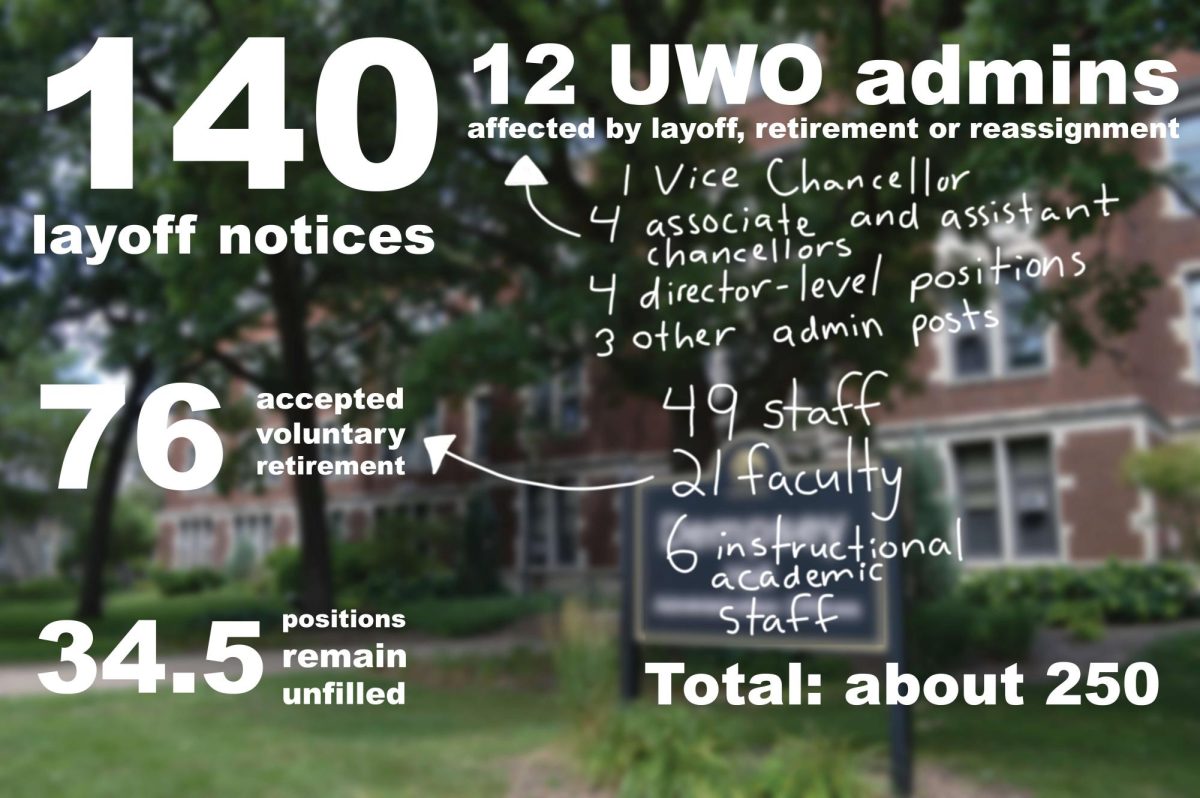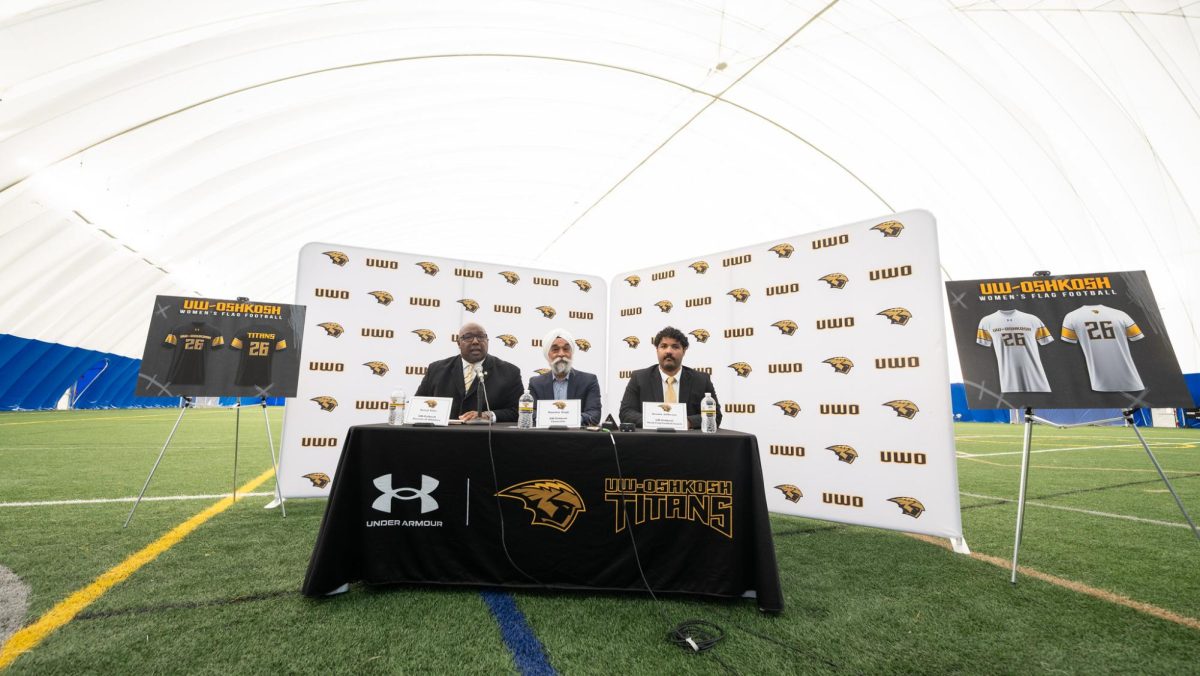A total of 140 UW Oshkosh employees received layoff notices on Monday in an effort to curb the university’s $18 million deficit. The layoffs are part of the university’s realignment plan, which also has 76 employees accepting voluntary retirement offers.
UWO Chancellor Andrew Leavitt added that 12 UWO leaders serving in 10 administrative positions are being affected by layoffs, retirement or reassignment — 22% of the positions in the administrative organizational chart.
These include the elimination of a vice chancellor position, four associate and assistant chancellors, four director-level positions and three other administrative positions.
The Advance-Titan reached out to Leavitt’s Chief of Staff Alex Hummel for a list of the administrators’ names. That email was forwarded to Chief Communications Officer Peggy Breister who denied further comment.
“UW Oshkosh is not providing names or positions of those who have been laid off,” Breister wrote in the email.
By cutting one in every six employees, the university expects to save about $14.7 million: about $8 million from layoffs, $4.76 million from voluntary retirements and $1.9 million from open positions.
The total number of layoffs plus voluntary retirements is 216 but 34.5 vacant positions will remain unfilled, bringing the total number of positions affected by layoffs, voluntary retirement and open positions to about 250.
The final day of employment for laid off staff is Jan. 20, 2024; no faculty have been laid off so far, Leavitt said Thursday.
The university’s administration has not released a master list of everyone affected and has denied a request for comment.
All of the full-time staff in the Office of International Education (OIE) have been laid off, leaving two part-time employees who are paid outside of the university.
The testing center has one employee left, the University Studies Program (USP) took a large hit, Reeve Union is losing many employees, and the LGBTQ+ Resource Center is losing its leadership.
The Advance-Titan also reached out to Project Success and the Career and Professional Development directors; both of those inquiries were also forwarded to Breister, who denied a request for comment.
Responding to the layoffs
On Tuesday, a “comfort event” was held to support staff affected by the layoffs. The event was organized, in part, by Misty McPhee, a professor of environmental studies and biology, who said that she orchestrated the event because “nothing had been organized for staff to provide support.”
McPhee said that her department will be impacted by the layoffs, as she heavily relies on staff members.
“The assistant that runs our environmental studies program as well as women and gender studies, African American studies and Hmong studies … the whole interdisciplinary studies program … one person has been supporting all of those groups, and she just lost her job,” she said. “One of the things that is abhorrent to me is the lack of understanding of people’s knowledge and the expertise they bring to these jobs, and what we’re losing by letting them go without thinking of who we’re letting go.”
One of the “comfort event” attendees, who agreed to speak anonymously, said that the university’s decision of who to lay off should have been based on different factors, such as seniority and expertise.
“I started working here in 2006 and have been here 17 years and was just let go,” they said. “I don’t believe that they did stuff by seniority, because there are people here who have been here for less time than me and their job is not affected.”
They also said that staff supervisors were not contacted on who they thought should stay and be let go, leading to experienced and integral individuals being cut.
“(The university) used an outside source that doesn’t know us,” they said. “I know that they were trying to make it fair but in a sense that does hurt us, because then this person (from an outside source) is just looking at numbers; they’re not looking at who provides what services. I don’t think that was the right way to go about it.”
Shrinking programs and departments have already raised concerns about the ability for teams and programs to operate. One such individual is Dale DeVries, a web designer within university marketing and communications who also received a layoff notification.
“This is my dream job; that’s gone,” he said. “I’m an alumnus here and I love this job.”
DeVries said that his department, which had 16 members when he started a couple of years ago, has shrunk to seven people: three marketing staff, two designers and a photographer on the creative team and one communications person.
With a diminishing team, DeVries said that he and his colleagues have been trying to make due; however, with the most recent cuts, he is skeptical about his team’s ability to fully function.
“Me and (my boss) were trying to formulate a great web strategy to make all of our sites coherent and easy for anyone to use, and that’s all gone now,” he said. “I don’t know how he’s going to pick up the pieces with just one person for all of the web for the university. It doesn’t seem possible — to me at least.”
Michelle Bogden Muetzel, who works within the university’s office of compliance, risk and integrity, said that the layoffs will affect her office, too, when it comes to experience and knowledge.
“A lot of my responsibilities are required by the UW System to be done to help us comply with a lot of state statutes and to help keep our campus safe,” she said. “I’m really concerned with how that’s going to be handled and how that transition is going to happen.”
In addition to Bogden Muetzel being laid off in her department, the environmental health and safety manager is also retiring.
“We have somebody else who is going to fill that position, but all of that historical knowledge for how we’ve been doing risk and safety for six, seven years or so is going to be gone,” she said.
Beyond the position
Meghann Krueger has a unique backstory at UWO. She started college at Oshkosh in the 90’s and has been in some way associated with the university since.
She started as a full-time employee in July of 2002 working in financial aid, but left in 2016 as the associate director of financial aid.
“I returned to UWO in February 2017 as a Limited Term Employee (LTE) in the Budget Office,” Krueger said. “I stayed a Financial Specialist LTE until Aug. 31, 2023.”
In April 2023, her life changed as her husband lost his job as president and COO of a manufacturing company.
“Our family now needed health insurance,” Krueger said.
Krueger applied for her current job, department assistant for sociology and public administration in early August and was offered the FTE position with a start date of Sept. 1, 2023, when Mike Ford of Public Administration was the chair of the hiring committee.
“He emailed HR on Tuesday, Aug. 22, 2023 informing them of my verbal acceptance of the offer,” Krueger said. “On Wednesday, Aug. 23, 2023, HR emailed Mike to inform him there is a hiring freeze and they would hold off until Friday to inform me they are rescinding my offer. That email also explained the process for an exception (or appeal).”
Paul Van Auken, chair of the sociology department, and Ford worked through the exception process for Krueger and received an email on Aug. 23 at 4:08 p.m. from Provost Edwin Martini stating he was working through the process and would update them the next day.
At 8:42 p.m. Aug. 24, the hiring committee received an email from Martini saying, “Just an update to let you know that VC Roberts and I agreed to an exception today on this request.”
“You can let her know that we will be moving ahead with the offer you all agreed on; it might take a day or two to get everything processed, but it will all be approved,” Martini said in the same email.
Krueger started her new position on Sept. 1, and just six weeks later, received notice that she would be laid off.
“You can see that I have many years experience working at UWO,” Krueger said. “Those years helped me build a unique skill set. I was surprised and frustrated by the layoff notice because Paul and Mike went through the process of the exception and it was approved.”
Krueger is left wondering why administration bothered granting her an exception.
“Why would I be hired, knowing they would be doing layoffs?” Krueger said. “It doesn’t make sense.”
Krueger, like many others, feels the deficit was handled poorly by the administration.
“There is no way to convince me that an $18 million deficit came out of left field,” Krueger said. “If the chancellor and VC (Robert) Roberts were clueless UWO was going to have this deficit, they are inept and should not be holding senior administrative roles.”
Krueger believes “in any other business world, these people would no longer be employed.”
“I strive for efficiency and believe there are ways to make UWO run more efficiently, but the decisions on who to lay off has been kept secret and further diminishes trust in administration,” Krueger said. “I doubt the people making the decision to send me a layoff notice know my skill set and how I could help in several areas of the institution. They don’t know because they didn’t ask.”
Krueger doesn’t know what’s next for her or her family.
“Unfortunately, the layoff notice is still sinking in,” Krueger said. “I hope my husband finds employment so there is some pressure taken off of me to find another job that I may not actually want.”
Amid the confusion and worry following the layoff notices, Leavitt called for community and solace.
“My hope is we will support each other today and in the days to come,” he said. “There is a long road in front of us as we restructure and rebuild, and we do so with fewer of the valued colleagues who have shared their expertise and talents with us for many years, and in some cases, decades.”










